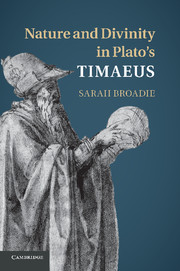Book contents
- Frontmatter
- Contents
- Acknowledgements
- What lies ahead
- Chapter 1 The separateness of the Demiurge
- Chapter 2 Paradigms and epistemic possibilities
- Chapter 3 The metaphysics of the paradigm
- Chapter 4 Immortal intellect under mortal conditions
- Chapter 5 The Timaeus–Critias complex
- Chapter 6 The genesis of the four elements
- Chapter 7 Divine and natural causation
- In conclusion
- Appendix on ‘parts of the paradigm’
- References
- General index
- Index locorum
Chapter 2 - Paradigms and epistemic possibilities
Published online by Cambridge University Press: 05 December 2011
- Frontmatter
- Contents
- Acknowledgements
- What lies ahead
- Chapter 1 The separateness of the Demiurge
- Chapter 2 Paradigms and epistemic possibilities
- Chapter 3 The metaphysics of the paradigm
- Chapter 4 Immortal intellect under mortal conditions
- Chapter 5 The Timaeus–Critias complex
- Chapter 6 The genesis of the four elements
- Chapter 7 Divine and natural causation
- In conclusion
- Appendix on ‘parts of the paradigm’
- References
- General index
- Index locorum
Summary
‘Which of the two paradigms?’ – defending the question
I turn now to that most notoriously Platonic of Plato’s metaphysical entities, the intelligible paradigm with reference to which the cosmos was made. The discussion in the last chapter of the ‘separateness’ of the demiurgic principle was about its distinctness from the cosmos and cosmic soul, not about its distinctness from the cosmic paradigm. This latter question, with concomitant proposals that the paradigm is an aspect of the Demiurge, or demiurgic efficacy an aspect of the paradigm, is also not the topic of this chapter. Whatever ontological mergers might be suggested between Demiurge and paradigm, the function of the paradigm is clearly different from that of the Demiurge: and the function of the paradigm-object is our present concern.
The topic of paradigms occurs first in complete generality. The cosmology is prefaced with an exordium (27d5–29d3) which (a) introduces three general considerations, (b) applies them to the cosmos in particular, and (c) draws a conclusion about the kind of discourse that is to follow. The three general considerations are: the distinction between being and becoming, which is introduced along with a corresponding distinction of cognitive states; the principle that whatever comes to be has a cause (which it is taken for granted is a purposeful agent); and the principle that a craftsman’s use of a changeless, as distinct from a generated, paradigm is sufficient and necessary for a beautiful product:
Whenever the craftsman keeps in view what is always changeless, and using a thing of that kind as his paradigm reproduces in his work its form and meaning, everything that he completes in this way is, of necessity, beautiful. But whenever <the craftsman has in view> something that has come to be, using a paradigm that has been generated, beautiful his work is not. (28a6–b2)
What is the basis of this general principle? It can only be the human practice of making things. But in applying the principle a few lines later to the particular case of our cosmos, Plato seems to exaggerate the parallel with human making in a ludicrous way:
Now the maker and father of this All is hard to find; and <even> if we found him, representing him in speech to everyone would be impossible. And so we must go back to this question about it: which of the two paradigms (poteron tôn paradeigmatôn) guided its maker when he fashioned it – the one that does not change and stays the same, or the one that has come to be? Well, if this cosmos is beautiful and its craftsman good, then clearly he had the eternal paradigm in view, whereas if . . . what is irreligious for anyone even to put into words, then he <had in view> one that has come to be. So it is evident to all that <he had in view> the eternal one. For the cosmos is the most beautiful among the things that have come to be, and he is the best among causes. This, then, is how it has come to be: it has been crafted in accordance with that which is changeless and grasped by wisdom in a rational account. (28c3–29b1)
For all the intended sublimity, this passage seems spoilt by a ridiculous implication: that the divine craftsman had, as human ones often do, a choice between two ways of proceeding, a worse and a better: model your product, which of course will be changeable and perceptible, on another such object of the same metaphysical kind; or model it in accordance with an intelligible paradigm. But how could a cosmos-like perceptible object be there for the world-maker to pass over it in his choice of paradigm? Surely the reason he uses an intelligible paradigm ought to be that for him, unlike human makers, no perceptible one would have been available. Of course, if sheer unavailability of the inferior alternative were the reason he adopted the superior one, his doing so would not manifest his prior goodness as clearly as the better choice would if choice were possible! But to pretend, in effect, that the inferior alternative was possible just so as to be able to congratulate the Demiurge on his ‘preference’ for the superior one, seems absurd. It is not as if there will be a shortage of other opportunities for displaying the power of the principle that the world-maker is the best of causes.
- Type
- Chapter
- Information
- Nature and Divinity in Plato's Timaeus , pp. 27 - 59Publisher: Cambridge University PressPrint publication year: 2011



